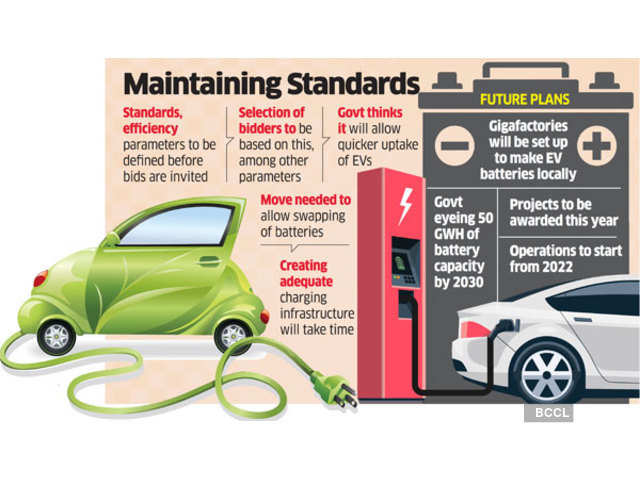Note4Students
From UPSC perspective, the following things are important :
Prelims level: EV Battery Swapping Policy
Mains level: Electric mobility

NITI Aayog is holding a consultation on the upcoming electric vehicle (EV) battery swapping policy.
What is BaaS?
- Battery-as-a-service (BaaS) is seen as a viable charging alternative.
- Manufacturers can sell EVs in two forms: Vehicles with fixed or removable batteries and vehicles with batteries on lease.
- If you buy an electric scooter with battery leasing, you do not pay for the cost of the battery—that makes the initial acquisition almost 40% cheaper.
- Users can swap drained batteries for a fully charged one at a swap station. The depleted batteries are then charged on or off-site.
- The advantages of swapping include low downtimes for commercial fleets, reduced space requirements, and lower upfront costs.
- It is also a viable solution for those who don’t have parking spots at home.
What is battery interoperability?
- That’s when a battery is compatible across vehicles and chargers, so you can seamlessly swap a battery at any swap station. This can help achieve scale.
- However, manufacturer and service providers say there are safety concerns around the ‘one-size-fits-all’ model and caution too much standardization can kill innovation.
Why hasn’t BaaS taken off yet?
- There are economic and operational constraints.
- Energy service providers offering swapping solutions have to charge 18% goods and services tax (GST) for swapping, compared to 5% GST on the purchase of an EV.
- Additionally, the government’s FAME-II incentives are not offered to vehicles sold with BaaS or swap station operators.
- While these are economic disadvantages compared to direct charging solutions, the lack of a dense and interoperable battery swap infrastructure has also hindered the roll-out.
- Manufacturers, on the other hand, are keen to create proprietary battery and charging systems.
Issues with BaaS
- There is a need for standardization of safety specifications as well as the battery.
- Swapping in the various permutations and combinations of batteries at a station where they have not been tested for compatibility could lead to safety hazards.
- Also, mandating only one type of battery to be eligible for concessions would be disadvantageous to many players.
Who offers BaaS in India?
- Bengaluru-based startup Bounce is the first e-two-wheeler maker to sell its scooters with BaaS, and claims to have achieved a million battery swaps.
- Others like Ola Electric and Ather have stuck to direct charging solutions, while Hero Electric offers both fixed and removable batteries.
- Many makers are working with energy service providers to offer battery swapping.
- The global precedent is a mixed bag: Ample, which offers swaps in the US, has found success with commercial fleets, while most personal users charge at home.
Why is Battery Swapping needed?
- High Cost of EVs: An EV, by industry standards, is 1.5-2x costlier than IC Engine counterpart and at least half the cost is from the battery pack.
- Cost reduction: Many manufacturers are offering batteries separately from a vehicle, reducing the cost. In that case, a fleet owner can buy vehicles without battery and utilize battery swapping.
- Range Anxiety: Another major reason stopping people from buying EVs is range anxiety, or in simple terms, the fear of battery getting empty without finding a charging station.
- Inadequate charging infrastructure: Unlike petrol pumps, EV charging stations are rare to spot and that further increases the range anxiety exponentially, especially while going on a road trip.
- Hazard management: In case of a Swapping Station, one can simply locate a station, go and replace the empty battery with a new one.
UPSC 2022 countdown has begun! Get your personal guidance plan now! (Click here)
Get an IAS/IPS ranker as your 1: 1 personal mentor for UPSC 2024

